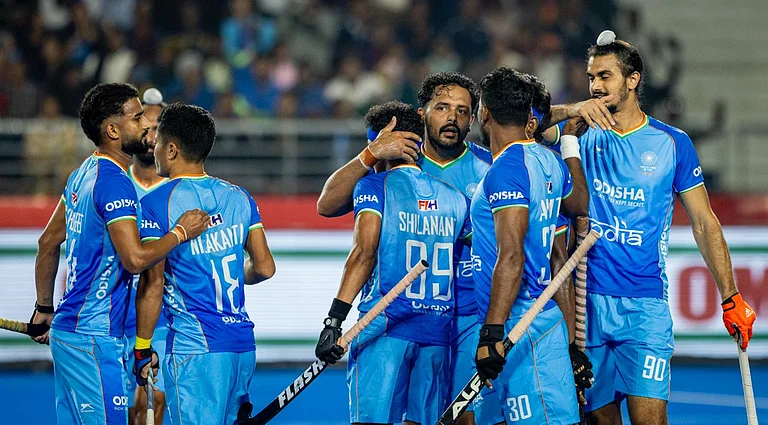A court in Pakistan's Islamabad on Saturday convicted former Prime Minister Imran Khan in the Toshakhana Case and sentenced him to three years of imprisonment.
Shortly after the conviction, Khan was arrested and was moved to a jail in Lahore.
Besides the Toshakhana Case, Khan is facing more than 100 cases that include cases of terrorism, blasphemy, treason, etc. Khan and his supporters in the Pakistan Tehrik-i-Insaaf (PTI) party allege these cases are politically motivated.
Ever since his ouster as the Prime Minister of Pakistan last year after losing a trust vote, Khan has alleged that the Shehbaz Sharif-led coalition, institutions like the all-powerful military and Judiciary, and the United States are together in a conspiracy against him.
Here we explain what's the Toshakhana Case, what are the other cases against him, and what's the road ahead for Khan.
What do we know of Imran Khan's conviction?
Former Pakistani Prime Minister Imran Khan was on Saturday convicted by an Islamabad court in the Toshakhana Case.
Shortly after the conviction, Khan was arrested and was taken to jail for his three-year sentence. He was also slapped with a fine of Pakistani Rs 1,00,000.
“The court finds its more than convincing that the complainant (ECP) had provided confidence-inspiring, well-knitted and corroborated evidence, and so the charge against the accused has successfully been proven that the accused has committed offence of corrupt practices by making and publishing false statements/declaration in respect of assets acquired by way of gifts from Toshakhana and disposed of during years 2018-2019 and 2019-2020,” ruled Additional District and Sessions Judge (ADSJ) Humayun Dilawar, as per Dawn newspaper.
The ECP mentioned in the judgement stands for Election Commission of Pakistan.
What is the Toshakhana Case?
The Toshakhana is a federal government department that is in charge of all the valuables received by officials and elected leaders while in office.
The case was filed against Khan by the Election Commission of Pakistan (ECP) for "deliberately concealing" the gifts he received during his term as the prime minister and retained them from the Toshakhana, according to The Express Tribune newspaper.
Khan has been convicted for not disclosing certain gifts to the Toshakhana and for irregularities in the sale of certain gifts in deposited in Toshakhana.
The Islamabad court ruled that Khan engaged in "corrupt practices" in dealings with the Toshakhana and benefitted at the cost of the exchequer.
The judge ruled, "He has been found guilty of corrupt practices by hiding the benefits he accrued from the national exchequer wilfully and intentionally. He cheated while providing information of gifts he obtained from Toshakhana which later proved to be false and inaccurate. His dishonesty has been established beyond doubt."
Prior to his conviction, the ECP had already disqualified Khan as a Member of National Assembly (equivalent of MP) over irregularities in the Toshakhana Case.
"On Oct 21, 2022, the ECP concluded that the former premier had indeed made 'false statements and incorrect declarations' regarding the gifts. The watchdog’s order had said Imran stood disqualified under Article 63(1)(p) of the Constitution," reported Dawn.
The Dawn further reports, citing government disclosure, that Khan "retained gifts worth more than Rs100m by Sept 24, 2018, just weeks after coming to power, and paid Rs20.1m to keep them".
"Along with his wife, the former premier got more than 111 gifts and retained most of them, as per the released documents. On May 18, 2021, a separate gift received by the wife of the former PM was taken after paying Rs2.9m against a value of Rs5.8m," reported Dawn.
Khan has therefore been convicted for concealing actual costs of gifts received, not disclosing gifts, and buying gifts from Toshakhana at undervalued rates that caused a loss to the exchequer.
What's the road ahead for Imran Khan?
As with every case, former Prime Minister Imran Khan can appeal the judgement in the higher courts.
Critically, the judgement comes at a time when Pakistan is slated to have general elections within three months. Earlier this week, Prime Minister Shehbaz Sharif announced that the National Assembly would be dissolved ahead of schedule on May 9, prompting general election in the next 90 days.
It remains to be see how Pakistan Therik-i-Insaaf (PTI) functions with its leader disqualified, convicted, and jailed.
Moreover, since the May 9 rampage of PTI members across Pakistan, in which they attacked, took over, and vandalised the houses of top army commanders in an unprecedented manner, several leaders and cadres of PTI have left the party. That day, following Khan's arrests by paramilitary Rangers, his loyalists had also entered the military headquarters.
Besides the Toshakhana Case, Khan has over 100 cases against him ranging from blasphemy to terrorism and treason.
As per a list submitted by Khan to the Islamabad High Court in May, Khan has a total of 121 cases against him, reported PTI.
The PTI reported, "The list states that 31 cases have been registered against Khan in the federal capital and 30 cases and call-up notices have been issued in Lahore, the capital of Punjab province...According to the list, 12 cases of terrorism have been registered against Imran in Lahore and 14 cases have been registered in Faisalabad. Some 22 terrorism cases have been registered against Imran Khan across the country."
In addition to the Toshakhana case, Khan and PTI leaders are also implicated in another inquiry by the National Accountability Bureau (NAB).
"The former prime minister, along with his wife Bushra Bibi and other PTI leaders, are facing a NAB inquiry related to a settlement between the PTI government and a property tycoon, which reportedly caused a loss of 190 million pounds to the national exchequer," reported PTI.
With all these cases against him, and a recent exodus from the party PTI after the May 9 violence, the road does not appear to be easy for Khan.


























